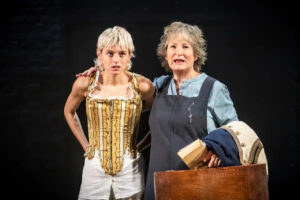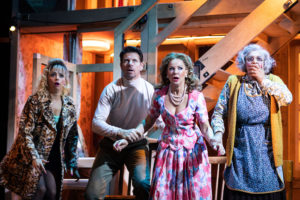Crown star Emma Corrin is mesmerising in comedy about gender freedom
★★★★

It may be nearly a hundred years since Virginia Woolf wrote the novel Orlando, but it’s only todat that our society has caught up with its story about the fluidity of gender, desire and time. As the novel, quoted in the play, says: ‘If you can just live another century.’
Emma Corrin, probably best known as young Princess Diana in The Crown, plays the eponymous protagonist. When the play begins, Orlando is a young male aristocrat in the court of Queen Elizabeth I.
In our first encounter with him, we catch a glimpse of a penis. It’s a startling and funny moment that sets the scene for the rest of the evening. His trusty servant-come-dresser-come-tutor-come-guardian angel Mrs Grimsditch tries to get him to put his trousers on. Deborah Findlay is funny, warm and down-to-earth, providing a necessary foil for Emma Corrin who gives a mesmerising performance as the romantic, confused, freedom-loving hero. The symbolic trouser-wearing is a motif throughout the play.
Even if they prefer the non-binary pronoun ‘they’, Emma Corrin, of course, doesn’t have a penis. It’s a theatrical prop. Before long, Orlando has lost that organ and mysteriously become a woman, as well as moving on many years to the court of James I without getting much older. To confirm the sex change, we catch a glimpse of her breasts, which I think were real but this is theatre, a world of pretence, so who knows?
In fact, theatre is a theme of this play. It moves through many theatrical styles as Orlando navigates from Elizabethan (a hint of Shakespeare) to Jacobean to Regency to Victorian times to the gradual liberation of the modern era. This substitutes for the literary journey that Orlando undertakes in the original novel. Theatre is not as effective a barometer for the changing attitudes to women, but it works nicely as a metaphor for being whatever you want to be.
To support the theme, Michael Grandage and designer Peter McKintosh have created a set that looks like a bare stage with brickwork and a large metal door. It’s populated with the trappings of a theatre- ropes and counterweights, a large costumes basket, a clothes rail, a stepladder and more. The set frequently features a bed that starts large and becomes much smaller in Victorian times (the worst of all periods for women). Having set up the theme, I think Neil Bartlett could have put it across more strongly in the script. There seems to be no equivalent of the constantly changing book that Orlando is writing and that provides a unifying thread through the novel.
From the start, this dramatised version offers the kind of inventive freewheeling imagination found in the original novel, because no less than nine Virginia Woolfs appear, speaking together and separately, to tell us the multi-faceted story of Orlando.

Much as she liked being a man, Orlando likes being a woman more and that’s how they remain, as the play develops into a romp through three centuries of the history of women in our society. And just as there are many different Virginia Woolfs, Orlando discovers there are many different ways we can desire. They also realise that time is elastic rather than linear, and that (spoiler alert) life needs to be enjoyed go the full in the here and now. It is above all a story that lauds the freedom of poetic imagination above the prosaic.
Orlando finds out what it is to be a woman, an experience made more shocking by them having been a man. They experience the disturbing effect a bare leg can have on heterosexual men and the way misogynistic men subjugate women. They realise that women can love each other, that love and betrayal go hand in hand. They find that men and women can dress up as each other for practical as well as sexual purposes.

Orlando is an everyperson rather than an intrepid hero or overpowering genius. Emma Corrin is tremendous at portraying the inarticulacy of the character, the frequent lack of understanding, but also the enthusiasm and optimism. They dominate the stage with their wide eyes, knotted features, hesitant speech, squirming body and sparkling smile. It’s a performance that is both funny and sad, and thoroughly engaging. As with the relationship between Orlando and Mrs Grimsditch, Emma Corrin’s youthful exuberance is balanced by the twinkly-eyed experience of Deborah Findlay.
In a play where gender is fluid, an entirely female cast bar one takes on all the roles, which of course leads to some mockery of men. Lucy Briers memorably plays a blustering naval officer who moves like a bantam cock. She also provides a haughty Queen Elizabeth.
Although writer Neil Bartlett couldn’t hope to convey the depth and complexity of Virginia Woolf’s novel, he does pick the important themes and moments, and by introducing the author onto the stage we get to hear direct quotes from the novel in her stream-of-consciousness way of writing.
Missing, in this fast moving 80 minute play, were the deeper relationships. Orlando’s first love Sasha whom they never forget, is played with verve by Millicent Wong, and their last Marmaduke is given a sensitive portrayal by Jodie McNee. But these lovers flash by as we skim across the surface of Orlando’s life. Their journey is not always pleasant, but it is ultimately optimistic.
Orlando is an entertaining evening thanks in no small part to Emma Corrin who displays all the signs of being a great star of the stage.
Orlando is playing at the Garrick Theatre in London until 25 February 2023.
Click here to watch this review on our YouTube channel Theatre.Reviews With Paul Seven








